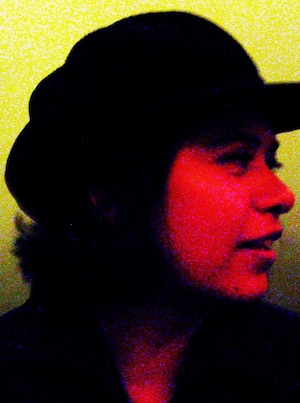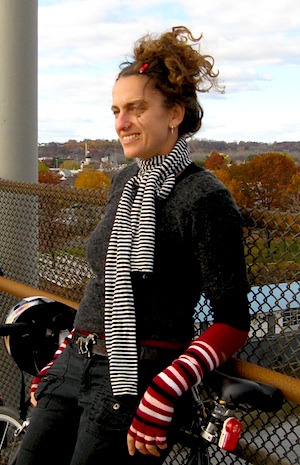
| Jacket 40 — Late 2010 | Jacket 40 Contents | Jacket Homepage | Search Jacket |
This piece is about 7 printed pages long.
It is copyright © Dolores Dorantes and Jen Hofer and Jacket magazine 2010.
See our [»»] Copyright notice.
The Internet address of this page is http://jacketmagazine.com/40/at-dorantes-d-dear-factory.shtml
Back to the A Tonalist feature Contents list
translated by Jen Hofer
SECTION ONE
Tengo un pie arrancado y puesto sobre esta oscuridad. Tengo otro pie desnudo. Prefiero dormir en esta tierra.
No pensar en el aliento largo de las vocaciones. Tuve una vocación, pero la vocación me atormentaba: soñar
(La boca era toda mía cuando tú me besabas pero ¿qué te hicieron, amor?)
Tuve el desierto y sólo tengo un pie desnudo. Un pie que no camina. Un pie por el que se encienden
las misericordias y las dudas.
Tú me viste a los ojos antes de preguntar “¿por qué?”. Tú tejías estruendos con un arco. Imaginé:
¿Por qué tus ojos están llenos de sangre? ¿Por qué se levantó una fuerza? Tú pronunciaste “trabajar”.
La sangre se congela. En tu invierno sólo hay alegres copos que reviven. Alegres caminatas. Creaciones.
Yo te escribo desde donde todo camino es hacia abajo. Yo te escribo entrando en una fosa
para venir a verte.
*
CONDÚCENOS
*
Casa voy a llamarle a esta boca abierta
*
I have one foot uprooted and placed upon this darkness. I have another foot naked. I prefer to sleep in this land.
Not to think about the long breath of vocations. I had a vocation, but my vocation tormented me: to dream
(The mouth was entirely mine when you were kissing me but — what did they do to you, love?)
I had the desert and I have only one foot naked. One foot that doesn’t walk. One foot
by which compassions and doubts ignite.
You looked in my eyes before you asked “why?” You were knitting thunderous noise with a bow. I imagined:
Why are your eyes filled with blood? Why was a force raised up? You uttered “to work.”
Blood freezes. In your winter there are only happy clots of snow that come to life again.
Happy walks. Creations.
I write you from the place where all paths lead downward. I write you entering a grave
to come to see you.
*
TRANSPORT US
*
House is what I’ll call this open mouth
*
Esto no va más allá de algún vestido al que
tenemos que buscarle los zapatos o
una noche que esconde su más preciada estrella tras la quemadura y
es ese fuego al que nos gusta entrar para mirarnos el corazón de despedidos
y desposeídos
que una época que no pudo borrarse arrastró con nosotros como
arrastra el mar un mar espeso sumergido en lo oscuro
Cada paisaje hirviendo recubre lo que fuimos tomando
muy a pecho y que ya es hora
de contarlo como si hubiera números para una decadencia recubierta de centros moribundos
Porque
hay que alinear los cadáveres con los que te pretendo hay
que apilar los crímenes para alcanzar la carne de un corazón que no batalla como tú
tú: un corazón sin remos
*
This doesn’t go any farther than some dress for which
we have to find the right shoes or
a night that hides its most precious star behind the burn and
it’s that fire we like to enter to give ourselves a look at the heart of those dismissed
and dispossessed
that an era that couldn’t be erased dragged us along with it as
the sea is dragged by a dense sea submerged in darkness
Each seething landscape laid over what we were taking
very much to heart and that it’s time now
to tell it as if there were numbers for a decadence overlaid with dying centers
Because
we must line up the cadavers with which you I attempt we
must pile up the crimes to reach the flesh of a heart that doesn’t struggle like you
you: a heart with no oars
*
Tu cielo también es una fosa Tu cielo es también la sepultura
Un transcurso hirviendo y calculado
Un territorio estéril aparente donde brota una vista
Con la vista te toco y son tus ojos los que mueven mi tacto y
(recostada de espaldas en la tierra) es la herida también lo que te busca
*
Your sky is also a grave Your sky is also the burial place
A passage of time seething and calculated
A sterile apparent territory where a view buds
With vision I touch you and what moves my touch are your eyes and
(reclining with its back against the earth) what seeks you is also the wound
*
No pueden prender una cadena en la carne que conoce la lluvia
de tu doloroso metal, amor
Eso
carece del vuelco natural donde te aplauden sólo
ciertos cadáveres con los que te pretendo, vida
me acerco a ti para atestiguar mi descomposición (pero te supe)
tras el vidrio en mis ojos supe
que tú estabas tranquila
Que tú estabas tranquila también es un color
el gris que únicamente veo desde tu silla
el gris verdoso que no puedo dejar porque
en él está tu forma y mi presencia
y mi presencia sólo ahí se encuentra como tú
Como tú que casi muero y me haces respirar
Como tú en la silla del placer distraído donde también se sienta
el zumbido de un látigo rector el zapato
que oprime mi cabeza y hunde mi paladar diente por diente, amor
Como tú que estabas tranquila también es la ceniza de esta sangre como tú
también es el océano genital de esta conquista
*
They can’t fasten chains on flesh that knows the rain
of your painful metal, love
That thing
lacks the natural jolt where they applaud you alone
certain cadavers with which I attempt you, life
I draw near you to witness my decomposition (but I knew you)
behind the glass in my eyes I knew
that you were calm
That you were calm is also a color
the grey I only see from your chair
the greenish grey I can’t leave behind because
in it is your form and my presence
and only there my presence locates itself like you
Like you that I almost die and you make me breathe
Like you in pleasure’s chair distracted where also sits
the crack of a governing whip the shoe
that oppresses my head and buries my palate a tooth for a tooth, love
Like you that you were calm is also the ash of this blood like you
also is the genital ocean of this conquest
*
Un accidente cruzó zumbando la imaginación con la que te recuerdo:
Vi la sangre
(aquí pasa algo que no sé)
aquí pasa una mano oscura que te sujeta el cuello, princesa
que te arrodilla, vida
“Para que te acuerdes de mis muertos
Para que te amarres de espaldas a mis mares muertos y escuches
su respiración sin ver y esperes otro
galope de mar y otro
golpe de mar y otro (que pase algo, amor)”
que pase
(caliente igual que tu zumbido)
*
An accident crackling across the imagination with which I remember you:
I saw the blood
(something I don’t know is occurring here)
here a dark hand occurs that grasps your neck, sugar
that brings you to your knees, life
“So you remember my dead
So you bind yourself with your back to my dead seas and you listen
to their breathing without seeing and you await another
gallop of the sea and another
wallop of the sea and another (that something might occur, love)”
might occur
(hot just like your whip-crack)
*
Te he visto herido como en el túnel del pasado
Donde no quedó pan ni vino y el amor, amor
brotó en la tubería como agua donde metimos la cabeza (ya)
para poner un cuerpo entero sobre el cuerpo de cada nuestro viejo amor muerto (ya)
en la superficie de cada corazón de máquina del tiempo esa
montaña de bocas nadadoras ese
océano de sangres revueltas
*
I’ve seen you wounded, as in the tunnel of the past
Where there was no longer any bread nor wine and love, love
was budding in the pipes like water where we had put our head (now)
to put an entire body upon the body of each our old dead love (now)
on the surface of each heart of the time machine that
mountain of swimming mouths that
ocean of bloods jumbled together
*

Dolores Dorantes
Dolores Dorantes lives in Ciudad Juárez, Chihuahua, where she is founding director of the border arts collective Compañía Frugal. She works as site director of the border office of Documentación y Estudios de Mujeres, A.C. (DEMAC), dedicated to promoting autobiographical writing among women in marginalized communities. She has published three books of poetry — Poemas para niños, SexoPUROsexoVELOZ and Septiembre — as well as the epistolary book Lola: Cartas Cortas. Translations of her work into English are forthcoming in Aufgabe, Mandorla and OR. Books 1–4 of the lifelong sequence Dolores Dorantes will be published by Kenning Editions in 2011. She updates her blog regularly: www.dorantes.blogspot.com.

Jen Hofer
Jen Hofer is a Los Angeles-based poet, translator, interpreter, teacher, knitter, book-maker, public letter-writer, and urban cyclist. Her most recent books are a series of anti-war-manifesto poems titled one (Palm Press, 2009); sexoPUROsexoVELOZ and Septiembre, a translation from Dolores Dorantes by Dolores Dorantes (Counterpath Press and Kenning Editions, 2008); The Route, a collaboration with Patrick Durgin (Atelos, 2008); and lip wolf, a translation of lobo de labio by Laura Solórzano (Action Books, 2007). She teaches at CalArts, Goddard College, and Otis College, and works nationally and locally as a social justice interpreter. She can be reached through www.jenhofer.net